By this time next Sunday, I'll have gone through O'Hare five times in eight days. I actually don't mind—yet—possibly because this is only my second visit of the week. The flight to DC isn't horribly delayed, and I've got a good perch to watch the planes:
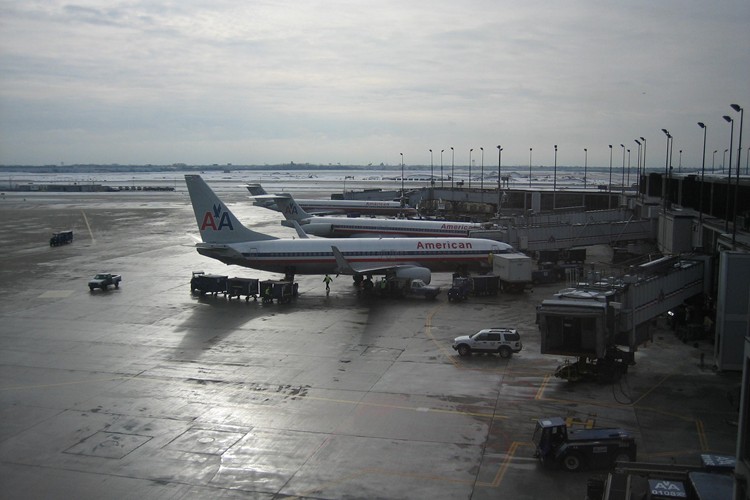
Gotta run. Time to wait on the plane instead of in the club...
That's how much snow covers Washington, D.C., right now:
A major storm that broke all records for a December snowfall buried the Washington area Saturday, forcing authorities to suspend public transportation, declare a state of emergency and plead with residents to stay home.
Hundreds of airline flights were canceled, Metro stopped running trains to aboveground stations and shopping malls closed early because few customers could navigate treacherous roads to get there on the last weekend before Christmas.
But at 10 p.m. Saturday, it appeared that the fury of the great storm might be fading into flurries. Over the next two hours, "any additional accumulation will be light," the National Weather Service said.
Yet, it will be days before things return to normal. Metro said the suspension of bus and aboveground rail service, which went into effect Saturday, would continue Sunday morning when the system reopened.
At the snowstorm's peak in the afternoon, flakes fell at the rate of two inches an hour. Some areas, particularly in Southern Maryland, experienced wind gusts up to 64 km/h. The total measured snowfall at Reagan Airport at 8:58 p.m. was 41.4 cm, but it was as high as 58 cm elsewhere in the region. That would be more snow in a 24-hour period than the region typically gets in an entire winter. According to Weather Service statistics, the storm ranked among the biggest snowfalls in local history.
National Airport has reopened, which is helpful because in half an hour I'm heading over to O'Hare to get there. Diane and Parker stayed another night in Petersburg, Va.; we all hope they get up to Washington by the time my flight arrives. I-95 looks clear on the many traffic cameras set up along the way, but the streets inside the District may not be.
What fun. It was going to be a quick long weekend trip, too...
Yesterday I mentioned how helpful American Airlines was helping me avoid what promised to be an excruciating layover at O'Hare today. It turns out, Washington's weather is worse than even the most pessimistic forecasts:
A snowstorm of historic proportions is burying a wide swath of the Mid-Atlantic under as much as 30 to 90 cm of snow as the weekend gets underway. The Washington D.C. area is to end up among the locations hardest hit with as much as 60 cm of snow a possibility -- the heaviest accumulation to hit the nation's capital in at least six years and enough to grant the windy, rapidly intensifying system a spot among that city's Top 3 biggest snowstorms. Washington snow records date back to 1885.
It could be worse. We could be in Alaska, for example:
With all the snow in the Lower 48, it should be noted the port city of Valdez in southern Alaska has been hit with one of its heaviest weekly snow tallies ever. Snow began falling Monday and by Wednesday had totaled 1.7 m.... Additional spells of snow boost had boosted tallies to 2 m as Friday ended.
The phrase "heaviest in the last six years" refers to the February 2003 monster that stranded me in D.C. for two days:
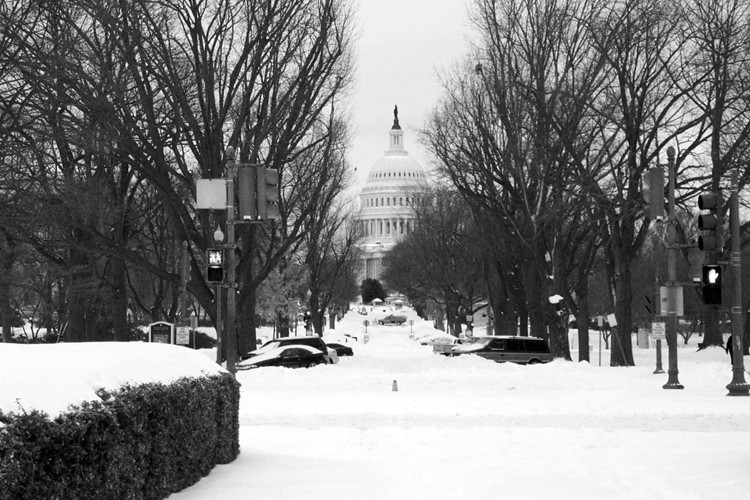
Unfortunately, Parker and Diane are caught up in all this. They left last night for Washington to meet me there (I had to fly there because of airline fare rules, believe it or not), but only got as far as Petersburg, Va.. He seems comfortable enough, but I think he needs to get OFF THE BED. NOW.
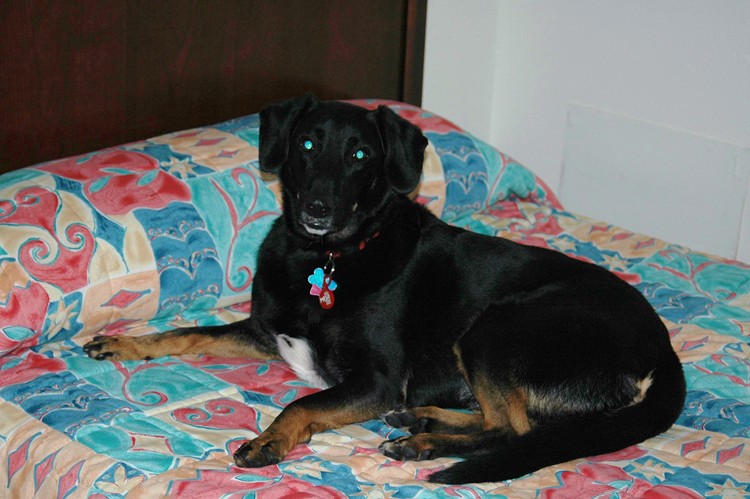
So, I get an unexpected night in Chicago tonight, and they (I hope) get to drive up to D.C. in daylight without snowplows terrorizing them. They might have to stay in central Virginia another night, though. The forecast for D.C. doesn't look encouraging:
Today: Snow. The snow could be heavy at times. High near 29. North wind around 18 mph. Chance of precipitation is 100%. Total daytime snow accumulation of 8 to 12 inches possible.
Tonight: Snow, mainly before 4am. The snow could be heavy at times. Low around 27. North wind between 14 and 16 mph. Chance of precipitation is 90%. New snow accumulation of 2 to 4 inches possible.
Sunday: A chance of snow, mainly before 7am. Mostly cloudy, with a high near 33. Northwest wind around 15 mph. Chance of precipitation is 30%. New snow accumulation of less than a half inch possible.
Nor does the radar image:
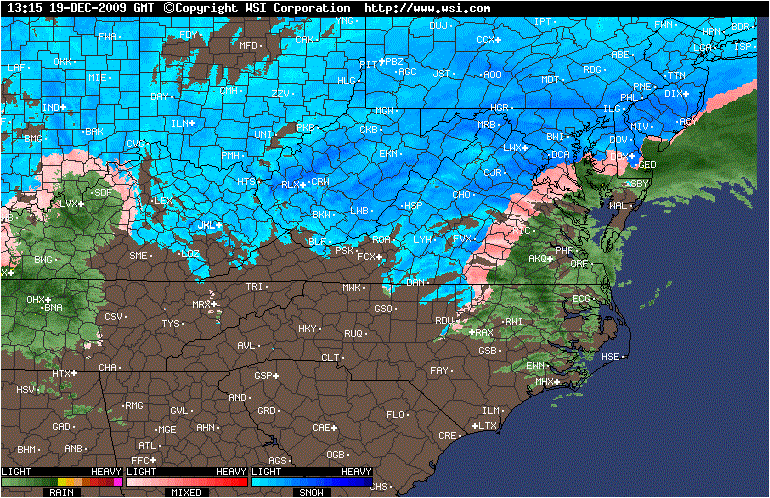
I hope that Virginia finds all (dozen) of its snowplows, and I hope Diane and Parker make it safely and quickly to D.C.
Original plan: Fly to Chicago tomorrow, then change at O'Hare for D.C. New plan: Fly to Chicago tomorrow, twiddle my thumbs at home, and fly to D.C. Sunday morning. Why? Because no one is flying to D.C. tomorrow:
The National Weather Service has issued a Winter Storm Warning for the entire [Washington] area, starting midnight Friday and lasting through 6 a.m. Sunday.
ABC 7 Meteorologist Chris Naille says the most of the region can expect 10 to 15 inches of snow, with up to 20 inches in spots along and east of I-95.
Parts of western and central Virginia could get up to 18 inches.
What fun. Fortunately, American Airlines has already gone into emergency mode, so when I called to see what my options were, they said "any plane Sunday."
So, I'll see everyone on Sunday.
A high court in the U.K. has ordered British Airways cabin crews not to strike over Christmas:
The dispute at BA centres on its desire to cut costs by reducing cabin staff on most flights and limiting wage increases. The airline’s pilots and engineers have already accepted austerity measures; cabin staff, notified of the proposed changes in July, are less inclined to compromise (though some have taken voluntary redundancy). On December 14th Unite, the union which represents almost all of the company’s 13,500 cabin staff, said they had voted overwhelmingly to strike.
The next day BA applied to London’s High Court for an injunction to stop them. The airline argued that Unite had not polled its members correctly: some votes were recorded from people no longer employed by BA, and the call for industrial action did not specify the intention to strike for 12 consecutive days precisely at Christmas. Had members known those details, fewer might have supported a strike, BA argued. The judge agreed, and ruled against the strike.
... Willie Walsh, the airline’s punchy Irish chief executive, was appointed in 2005 to knock such practices into competitive shape. He is unlikely to yield much ground to union militancy. It seems that BA’s core shareholders support him: the share price hardly moved when the strike was announced. Many reckoned that the benefits of BA’s restructuring outweighed the likely damage from the threatened strike. Estimates of potential net revenue loss over the 12 days ranged from £60m to £160m, whereas the benefits of restructuring were put by some analysts at £60m a year.
That court order can't have helped the union. Generally I'm sympathetic to organized labor, being a leftie with some knowledge of labor history, but the union here scored an own goal, as they say in Britain. I'll be on a BA flight in late January, and I can't wait to find out first hand what the cabin crews really think.
Via the Freakonomics blog, the New Scientist has examined the science behind the eternal question, dogs or cats?
Utility
Dogs can hunt, herd and guard. They can sniff out drugs and bombs and even whale faeces; they guide blind and deaf people, race for sport, pull sleds, find someone buried by an avalanche, help children learn and possibly even predict earthquakes. Cats are good if you have an infestation of rodents.
Perhaps that assessment is unfair, though. After all, we love our pets for other reasons. Cats are beautiful and soft, and stroking them has been shown to reduce stress. Then again, dogs are also good stress-busters: owning one can lower your blood pressure and cholesterol levels. What's more, Fido has other health benefits. Daily dog walks may be a chore, but they repay the effort, not just in terms of regular exercise, but also by providing immune-boosting opportunities for social contact with other dog walkers. That's why in a head-to-head contest of health benefits, it's dogs all the way
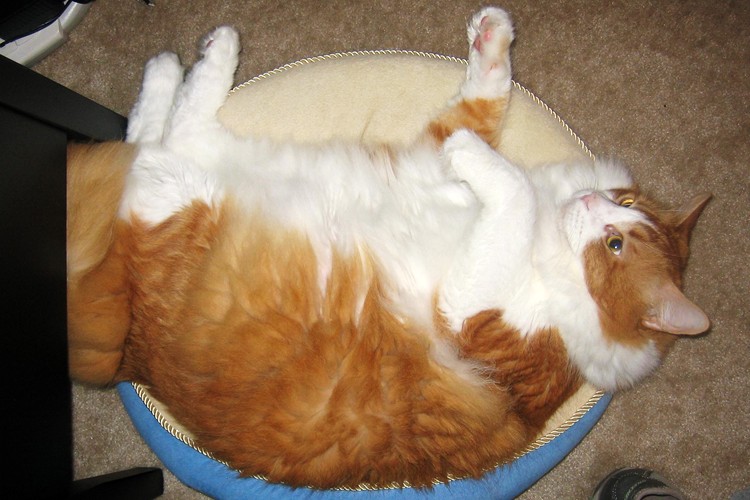 Having spent the last 9 days watching the two species interact, I have seen evidence of the magazine's conclusions. The cats Parker has suffered (and who have suffered him) haven't demonstrated stellar problem-solving skills, but they have learned that moving quickly across the living room causes lots of noise (the dog barks, the human corrects the dog), while slinking on their bellies slowly sometimes causes nothing more than a growl and a small correction. One of the cats (Nick, the orange pile of...cat pictured right) has the IQ of a philodendron, and still has not figured out that moving away from the dog cuts down on the noise. (Nick is just ornery, hissing at people even while getting brushed and purring. Yes, he hisses while purring. But that's a different post.)
Having spent the last 9 days watching the two species interact, I have seen evidence of the magazine's conclusions. The cats Parker has suffered (and who have suffered him) haven't demonstrated stellar problem-solving skills, but they have learned that moving quickly across the living room causes lots of noise (the dog barks, the human corrects the dog), while slinking on their bellies slowly sometimes causes nothing more than a growl and a small correction. One of the cats (Nick, the orange pile of...cat pictured right) has the IQ of a philodendron, and still has not figured out that moving away from the dog cuts down on the noise. (Nick is just ornery, hissing at people even while getting brushed and purring. Yes, he hisses while purring. But that's a different post.)
Anyway, I vote for dogs. Cats are fine as accent pillows and occasionally if you have a granary you need protected from rodents. Dogs are actually happy to see you when you get home, even if you don't have any food in your hand.
Time to walk Parker.
Parker got a chance to explore Oakwood Park today, the first sunny day we've had since we got here a week ago. The park is huge—I would guess about 75 hectares—and Parker (with help) ran around the whole thing:
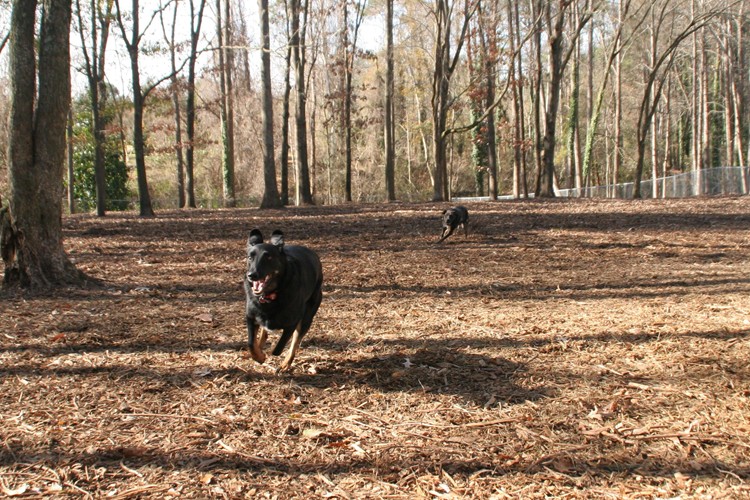
He also did exceptionally well on come-sit drills, leading me to the conclusion that he knows when I have treats. Of course, so does everyone else, like this beautiful Rhodesian ridgeback who kept sticking her nose into my treat pocket:
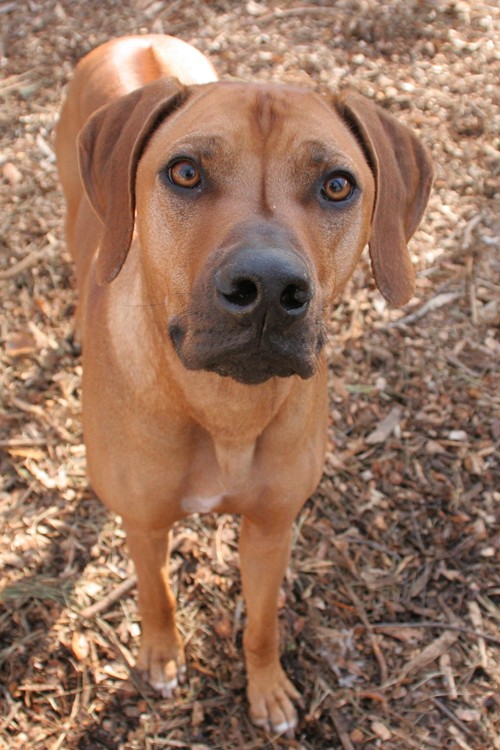
Parker is now sleeping, which I hope lasts through the first third of my Decision Models final. And he's tired enough to ignore the cats. Mission: Accomplished!
Krugman has a good summary:
[T]he belief that lower wages would raise overall employment rests on a fallacy of composition. In reality, reducing wages would at best do nothing for employment; more likely it would actually be contractionary.
Here’s how the fallacy works: if some subset of the work force accepts lower wages, it can gain jobs. If workers in the widget industry take a pay cut, this will lead to lower prices of widgets relative to other things, so people will buy more widgets, hence more employment.
But if everyone takes a pay cut, that logic no longer applies. The only way a general cut in wages can increase employment is if it leads people to buy more across the board.
Really, employment won't rise until after the fundamentals get better, and general wages have very little to do with it.
Specific wage decreases do have specific effects; however, smart employers avoid offering significantly lower wages to higher-skilled workers because they don't want those workers to leave as soon as conditions improve.
In this case, "town" has a State Capitol building:
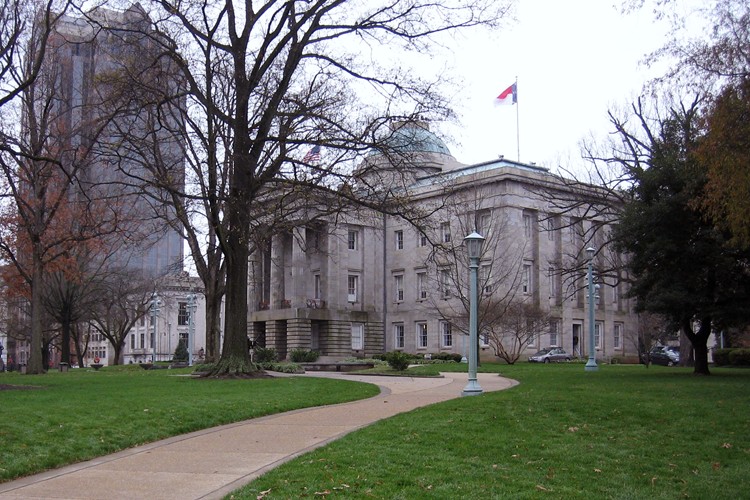
Parker seemed to enjoy the Oakwood neighborhood just east of the state government complex, too.